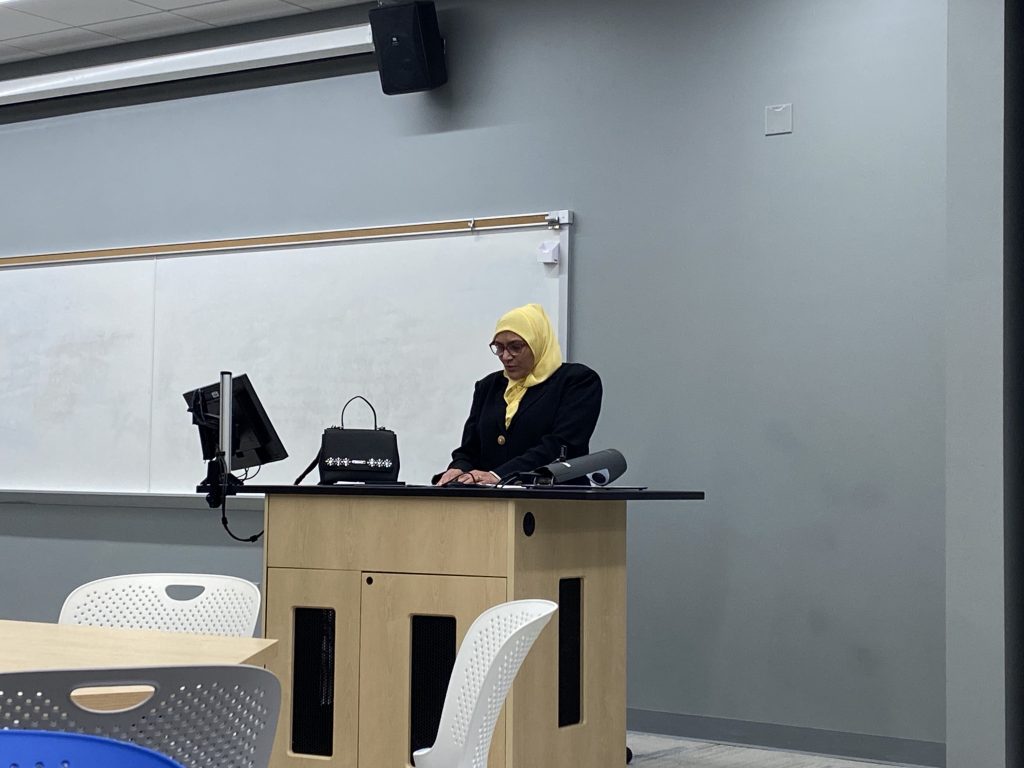
On Feb. 2, members from the Muslim Student Association (MSA) gathered together in the BECC to celebrate World Hijab Day with speaker Alimah Nusrat Abdul Kader.
The holiday falls on Feb. 1 and to kick off the celebrations, MSA hosted a booth in the Michel Student Center where students were able to try on a hijab and get a free henna tattoo.
World Hijab Day celebrates the rights of women who choose to wear the hijab and their religious freedom to do so. Every woman is invited to wear a hijab to celebrate the freedom that women have to wear the hijab.
Abdul Kader graduated from the Alimiyah program, which includes the study of the law of the Quran, at the Darul Uloom in Chicago. She also completed the Foundational Islamic Sciences program at the Qalam Institute Seminary in Dallas, Texas and holds a doctorate in dental medicine from the University of Pittsburgh.
During the event, Abdul Kader read chapters from the Quran and other readings involving the hijab to help educate the true, detailed meaning of what wearing a hijab means.
For some, it represents religious freedom and an outward devotion towards their faith among other meanings. Others wear it to feel connected to their culture.
She mentioned that the Quran uses the word “hijab” in a different context. When quoted in the Arabic language, the word means “a barrier.” Not only do women choose to cover their hair, but men wrap their hair as a sign of faith as well.
Abdul Kader quoted chapter 33, verse 59 of the Quran to make her point of how, in the Muslim culture, the woman’s body is reduced to only being used to sell items. In Islam, wearing a hijab protects the woman’s body and shows their character rather than their body.
“Islam defines the honor of a woman very differently, because of her righteousness and her relationship with God, her piety and devotion to him …” Abdul Kader said. “… that she is not here to please men, but to please God.”
Later, Abdul Kader talked about the wisdoms behind the reason some women choose to wear a hijab. She spoke about wearing the weight of publicly representing their faith in a time where it may be difficult to do so as a result of Islamophobia running rampant across the globe.
“One of the wisdoms of hijab is to simply dissociate ourselves from our outer selves to focusing and developing our inner selves,” Abdul Kader said.
In her personal journey with coming to terms with her faith and wearing a hijab in India, Abdul Kader did not wear a hijab of her own until she was older. Her mother was shocked with her decision because Abdul Kader was opposed to wearing one growing up. It didn’t phase Abdul Kader, however, because she had found strength in her faith.
Currently in Iran, women are fighting for the choice of wearing a hijab on their own. This has led to protests across the country.
In another celebration of the hijab and the woman’s right to choose, Scientista, another club on campus, hosted a fundraising event the same night to help raise money for the women of Iran and their freedom to choose to not wear their hijab.
“We believe that all women should have a choice to wear the hijab freely or not wear a hijab,” senior biochemistry major, Liliana Garcia said.
Along with sharing her personal experiences, Abdul Kader also brought up her daughters. Her daughter started to wear her hijab during the second grade. She made sure to warn her daughter about the insults and discrimination that she may face.
But her daughter was determined to wear the hijab so she was able to pray during the school day and honor her faith. This made Abdul Kader extremely proud of her daughter and her decision.
“When I saw her determination, she had my full support,” Abdul Kader said.
Abdul Kader’s daughter is now a sophomore in high school and continues to wear the hijab and the jilbab, an outer garment that covers the woman’s body. Her classmates now turn to her when they have questions about the hijab and Muslim culture.
To end the event, Abdul Kader discussed how the hijab is now seen as a weapon and a pawn in the world of politics. Ideas that the hijab is a form of oppression have spawned and are sometimes used as a rallying point for western white feminists.
She left the audience with a quote from Nazma Khan, the founder of World Hijab Day.
“In life when we go through pain and struggles, we have two choices, either we go with them to the circumstances and give away our power,” Abdul Kader said. “Or we rise above all pain and turn our struggles into strength, our wounds into wisdom and our pain into power.”




